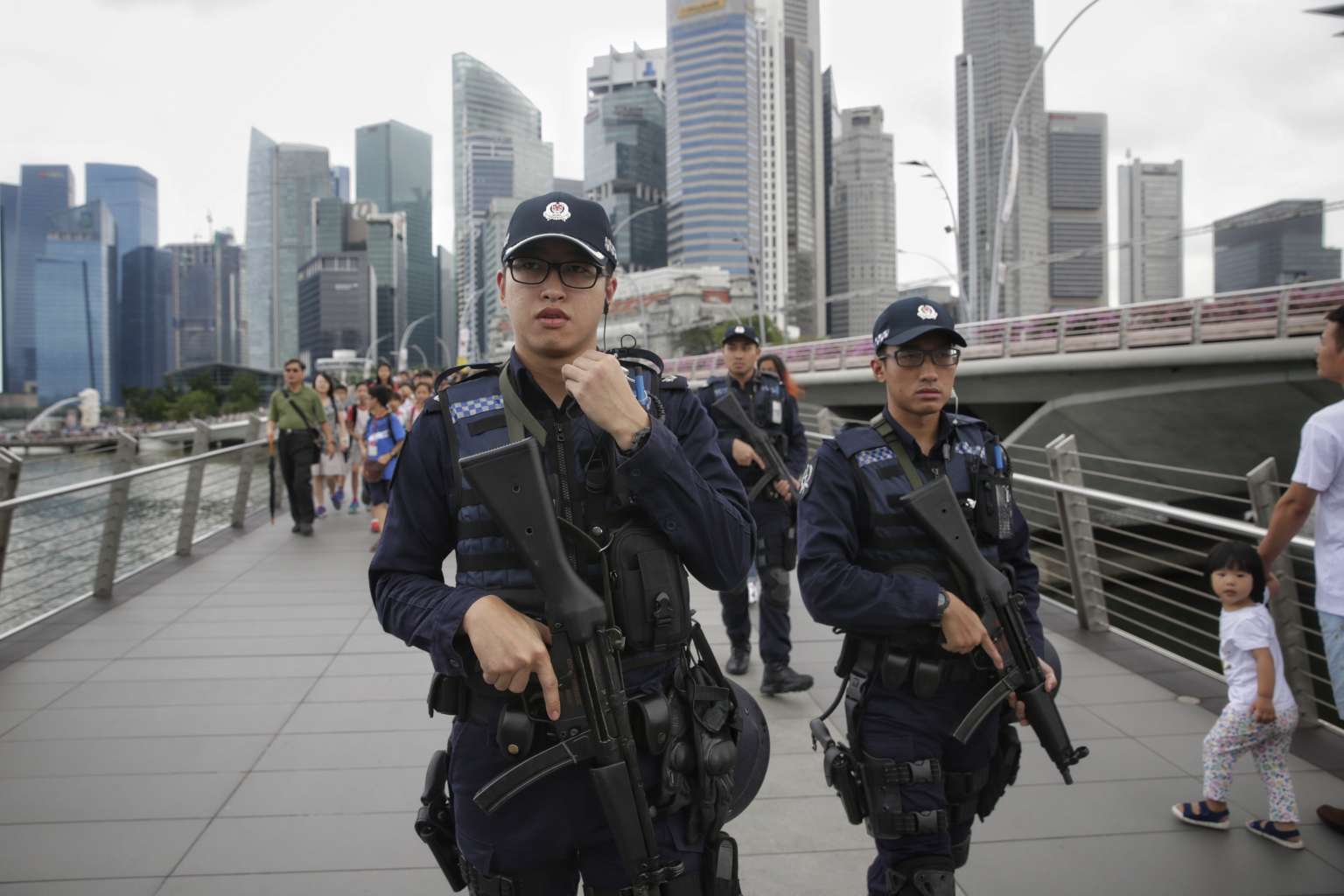National Day Rally 2016: Singapore has been acting against real terrorist plots quietly, says PM Lee
Sign up now: Get ST's newsletters delivered to your inbox

Members of the Emergency Response Team patrolling along the Jubilee Bridge on July 22, 2016.
ST PHOTO: KEVIN LIM
SINGAPORE - The authorities have been quietly acting on "definite" terrorist plots against Singapore, Prime Minister Lee Hsien Loong revealed in his National Day Rally speech on Sunday (Aug 21).
In the latest - and clearest - government reiteration that Singapore is firmly within terrorists' sights, Mr Lee said some of the stepped up security in Singapore has been in response to what security agencies here consider "a real threat" based on intelligence.
One such plot caught Singaporeans' attention earlier this month, when the Batam authorities arrested factory worker Gigih Rahmat Dewa, 31, and five others.
The Batam cell had been planning a rocket attack on Marina Bay together with a Syrian-based Indonesian ISIS militant.
But it is far from the only terror plan that the authorities have had to contend with, said Mr Lee.
"Gigih's plot to attack MBS is not the only definite plan by terrorists to attack targets in Singapore that we know of," said Mr Lee.
"We know there have been others, we've quietly acted on the information, we've taken precautions."
These include stepped-up patrols and increased protection for major events and for prominent premises. The authorities have also shifted and rescheduled certain events because of these threats, he added.
"We take it seriously: It's not certain enough to warn everybody publicly, but serious enough for us to act quietly.
"So the next time you see a patrol in the city, or some extra security in some areas, it may be we are just taking precautions, or doing a show of force as deterrence," said Mr Lee.
"But it could also be in response to a real threat that we've heard about."
Driving home the urgent and growing threat that terrorism poses to Singapore today, Mr Lee touched on the topic and the importance of maintaining societal cohesion in all three of his speeches last night.
Within the region, terror groups are active and have shown their capacity to carry out attacks, he said.
Despite a security crackdown by the Indonesian police last December that dismantled many terrorist cells, one cell that evaded the dragnet mounted the January attack in downtown Jakarta.
Meanwhile, Malaysia suffered a grenade attack in June, while the authorities there have arrested some 200 ISIS supporters, including at least 13 armed forces personnel, said Mr Lee.
It also found that seven prison wardens had been radicalised by the detainees they were handling, and had to themselves be deradicalised.
The Islamic State in Syria and Iraq also has and continues to court South-east Asians to its extremist cause, he added.
There are about 1,000 Malaysians and Indonesians in the Middle East fighting for the group, enough for ISIS to form a Bahasa-speaking battalion called the Katibah Nusantara.
One of its leaders is Bahrun Naim, an Indonesian militant who the authorities there said had provided Gigih and his men training and instructions through Facebook chat.
The group's media operations put out a magazine in Bahasa called Al Fatihin, which the Government banned in Singapore last month, he noted.
"ISIS itself puts out propaganda videos in Bahasa, showing child fighters training with firearms and South-east Asian fighters beheading hostages, to attract recruits from South-east Asia," he said.
The threat is also domestic, and Singaporeans are not uniquely immune to jihadist propaganda, said Mr Lee.
He noted that the Government has arrested a dozen Singaporeans, most of whom were self-radicalised. Several tried to go to the Middle East to join ISIS, and a few were prepared to mount attacks in Singapore, including one who planned to kill the President or Prime Minister.
Last Friday, police dealt with another four Singaporeans who had become self-radicalised and intended to travel to Syria to join ISIS.
"We continue to pick up a steady trickle of such people, one or two a month," he said.
Fortunately, Singapore has a font of strength in fighting the forces of intolerance and extremism, said Mr Lee: Communities here and their leaders innately understand the importance of multiracialism, the need to be inclusive, and to compromise so as to maintain our social harmony.
Chinese HDB residents burn their joss paper in special burners instead of in the open during the seventh-month festival, for instance, while mosques take care not to disturb their neighbours by lowering the volume of their call-to-prayer, he said.
And this give-and-take has to be nurtured at a time when terrorism threatens our social fabric.
"Each community has to engage and understand each other, it must not segregate itself from other communities.
"We have to respect one another's religion, we cannot treat other groups as infidels," he added. "If religious groups did the opposite, take an exclusivist approach, discourage interaction, contact with others, we will deepen our fault lines and weaken our society."


